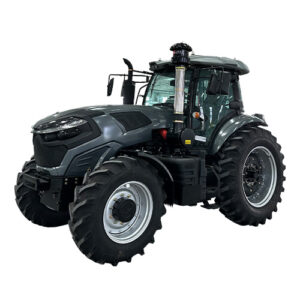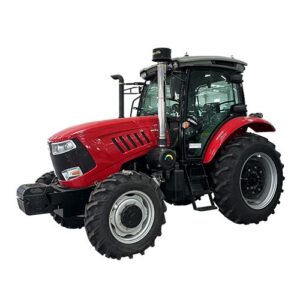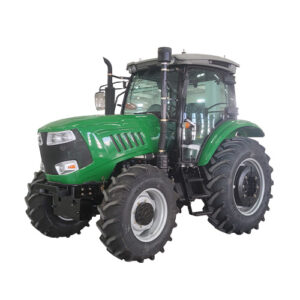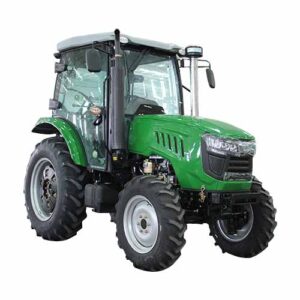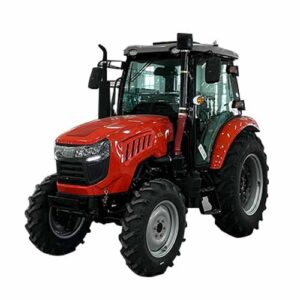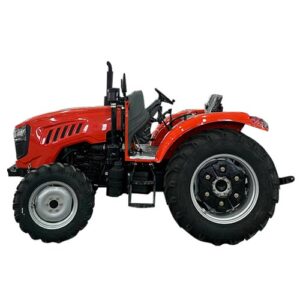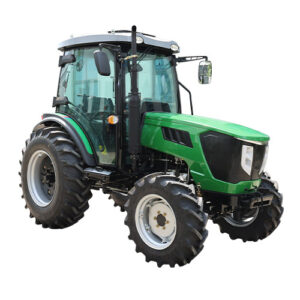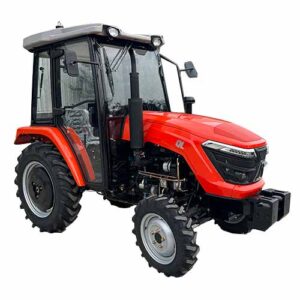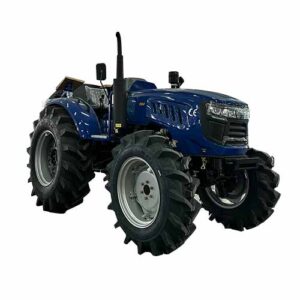Introduction
In modern agriculture, the use of tractors has revolutionized farming practices, significantly enhancing efficiency and productivity on the field. Tractors used for farming are versatile machines that perform a wide range of tasks, from plowing and planting to harvesting and hauling. This comprehensive guide will explore the various types of tractors used for farming, their benefits, and how they contribute to more efficient agricultural operations.
The Role of Tractors in Modern Farming
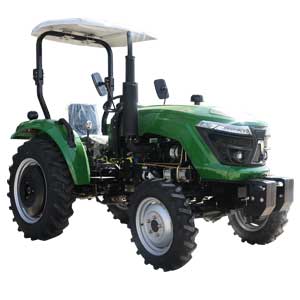
Importance of Tractors in Agriculture
Tractors are indispensable in modern agriculture due to their ability to perform multiple tasks that were traditionally done manually. They help farmers save time, reduce labor costs, and increase productivity, ultimately leading to higher crop yields and improved profitability.
- Time-Saving: Tractors complete tasks faster than manual labor.
- Cost-Effective: Reduces the need for a large workforce.
- Increased Productivity: Enhances the efficiency of farming operations.
Evolution of Farming Tractors
The evolution of tractors used for farming has seen significant advancements in technology and design. From the early steam-powered tractors to today’s sophisticated machines equipped with GPS and automation, the development of tractors has continually aimed to meet the changing needs of farmers.
- Early Tractors: Steam-powered and cumbersome.
- Modern Tractors: Advanced technology, increased power, and versatility.
Types of Tractors Used for Farming
Utility Tractors
Versatility and Applications
Utility tractors are among the most common tractors used for farming. They are designed to perform a variety of tasks, making them highly versatile. Utility tractors are ideal for small to medium-sized farms and can be used for plowing, tilling, planting, and transporting materials.
- Versatility: Suitable for various farming tasks.
- Ideal Size: Perfect for small to medium-sized farms.
Row Crop Tractors
Specialized for Row Crops
Row crop tractors are specifically designed for farming row crops such as corn, soybeans, and cotton. These tractors offer high ground clearance, precise steering, and adjustable track widths, making them perfect for planting, cultivating, and harvesting row crops.
- High Ground Clearance: Allows for efficient crop management.
- Precision Steering: Enhances accuracy in planting and cultivating.
Orchard Tractors
Designed for Orchards
Orchard tractors are compact and maneuverable, designed to operate efficiently in the narrow spaces between orchard rows. They often have features that protect the trees and fruit, such as rounded edges and enclosed cabs.
- Compact Design: Fits between orchard rows.
- Tree Protection: Features to prevent damage to trees and fruit.
Compact Tractors
Suitable for Smaller Farms
Compact tractors are smaller versions of utility tractors and are ideal for small farms, gardens, and vineyards. Despite their size, they are powerful and versatile, capable of performing tasks such as mowing, digging, and light hauling.
- Small Size: Ideal for limited space operations.
- Versatile: Can perform a variety of tasks.
Industrial Tractors
Heavy-Duty Applications
Industrial tractors are built for heavy-duty tasks and are commonly used in construction and industrial settings. They are not typically used for traditional farming but can be valuable for tasks such as land clearing, heavy lifting, and hauling large loads.
- Heavy-Duty: Designed for tough tasks.
- Industrial Use: Commonly found in construction and industrial applications.
Table: Comparison of Different Types of Tractors Used for Farming
| Type of Tractor | Primary Use | Key Features |
|---|---|---|
| Utility Tractors | General farming tasks | Versatility, suitable for small to medium farms |
| Row Crop Tractors | Row crop farming | High ground clearance, precision steering |
| Orchard Tractors | Orchard farming | Compact design, tree protection |
| Compact Tractors | Small farms, gardens, vineyards | Small size, versatile |
| Industrial Tractors | Heavy-duty tasks | Heavy-duty build, industrial use |
Benefits of Tractors Used for Farming
Increased Productivity
Time and Labor Savings
Tractors significantly increase productivity by completing tasks faster and more efficiently than manual labor. This time and labor savings allow farmers to focus on other important aspects of their operations, such as crop management and business planning.
- Faster Task Completion: Reduces the time required for farming tasks.
- Labor Reduction: Decreases the need for manual labor.
Higher Crop Yields
The efficiency and precision offered by modern tractors contribute to higher crop yields. Tractors enable timely planting, proper soil preparation, and efficient harvesting, all of which are critical for maximizing crop production.
- Efficient Planting: Ensures optimal planting times and conditions.
- Effective Harvesting: Minimizes crop loss during harvest.
Cost-Effectiveness
Long-Term Investment
While the initial cost of purchasing a tractor can be high, it is a long-term investment that pays off over time. Tractors reduce labor costs, increase efficiency, and contribute to higher crop yields, all of which enhance the profitability of farming operations.
- Initial Cost: High upfront investment.
- Long-Term Savings: Reduces ongoing labor and operational costs.
Maintenance and Durability
Modern tractors are built to last and require minimal maintenance when properly cared for. Regular maintenance ensures that tractors remain in good working condition, reducing downtime and repair costs.
- Durable Build: Designed for long-term use.
- Low Maintenance: Regular care ensures longevity and reliability.
Versatility and Adaptability
Wide Range of Tasks
Tractors are highly versatile machines that can be used for a wide range of tasks, from soil preparation and planting to irrigation and harvesting. This versatility makes them an invaluable tool for farmers.
- Multiple Functions: Capable of performing various farming tasks.
- Adaptable: Can be equipped with different attachments for specialized tasks.
Technological Advancements
Modern tractors are equipped with advanced technology such as GPS, automation, and precision farming tools. These advancements enhance the efficiency and accuracy of farming operations, leading to better crop management and higher yields.
- Advanced Technology: Enhances efficiency and precision.
- Precision Farming: Improves crop management and yields.
How to Choose the Right Tractor for Your Farm
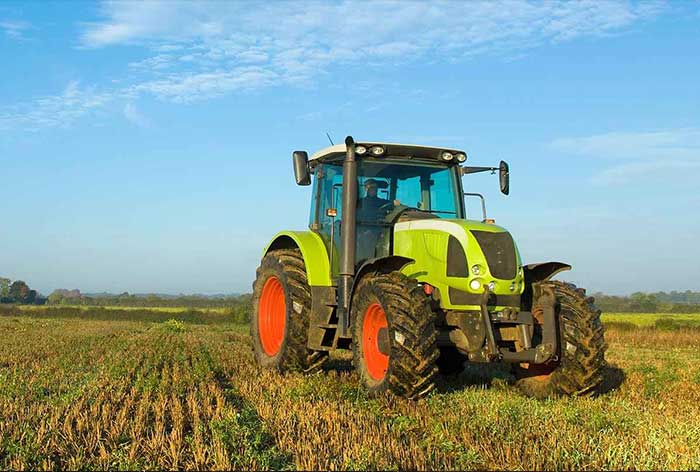
Assessing Your Needs
Farm Size and Type
Consider the size and type of your farm when choosing a tractor. Larger farms may require more powerful tractors with advanced features, while smaller farms might benefit from compact or utility tractors.
- Farm Size: Determines the power and size of the tractor needed.
- Farm Type: Specific needs based on the crops and tasks involved.
Specific Tasks
Identify the specific tasks you need the tractor to perform. Different types of tractors are designed for different tasks, so it’s important to choose one that meets your specific needs.
- Task Identification: List the tasks the tractor will perform.
- Specialized Functions: Ensure the tractor can handle these tasks efficiently.
Evaluating Features
Key Features to Consider
Look for features such as horsepower, fuel efficiency, comfort, and ease of use. Modern tractors come with a range of features that can enhance their performance and user experience.
- Horsepower: Determines the tractor’s power and capabilities.
- Fuel Efficiency: Reduces operational costs.
- Comfort: Ensures the operator’s comfort during long hours of use.
- Ease of Use: User-friendly controls and features.
Budget and Financing
Cost vs. Value
Consider the cost of the tractor in relation to its value and the benefits it offers. While it may be tempting to choose a cheaper option, investing in a quality tractor can provide long-term benefits and savings.
- Budget Considerations: Set a budget based on your financial situation.
- Value Assessment: Evaluate the long-term benefits and savings.
Financing Options
Explore financing options if the upfront cost is a concern. Many dealers and financial institutions offer financing plans that can make purchasing a tractor more affordable.
- Financing Plans: Look for options that fit your budget.
- Dealer Financing: Many dealers offer financing to help with the purchase.
Conclusion
Tractors used for farming are essential tools that enhance efficiency, productivity, and profitability on the field. By understanding the different types of tractors and their specific uses, farmers can make informed decisions that meet their unique needs. Whether you are a small-scale farmer or managing a large agricultural operation, choosing the right tractor can significantly impact your success and sustainability in farming.
FAQ
What are the main types of tractors used for farming?
The main types of tractors used for farming include utility tractors, row crop tractors, orchard tractors, compact tractors, and industrial tractors. Each type is designed for specific tasks and farm sizes.
How do tractors used for farming increase productivity?
Tractors increase productivity by completing tasks faster and more efficiently than manual labor. They enable timely planting, proper soil preparation, and efficient harvesting, all of which contribute to higher crop yields.
What should I consider when choosing a tractor for my farm?
When choosing a tractor, consider the size and type of your farm, the specific tasks you need the tractor to perform, and the key features such as horsepower, fuel efficiency, and comfort. Budget and financing options should also be evaluated.
Are modern tractors equipped with advanced technology?
Yes, modern tractors are equipped with advanced technology such as GPS, automation, and precision farming tools. These advancements enhance the efficiency and accuracy of farming operations, leading to better crop management and higher yields.
How does the cost of a tractor compare to its long-term benefits?
While the initial cost of purchasing a tractor can be high, it is a long-term investment that pays off over time. Tractors reduce labor costs, increase efficiency, and contribute to higher crop yields, enhancing the profitability of farming operations. Regular maintenance ensures longevity and reliability, further adding to the long-term benefits.
What tasks are compact tractors used for in farming?
Compact tractors used for farming are ideal for small farms, gardens, and vineyards. They can perform various tasks such as mowing, digging, and light hauling, making them suitable for operations where space is limited but versatility is needed.
How do industrial tractors fit into farming operations?
Industrial tractors used for farming are built for heavy-duty tasks and are often used in construction and industrial settings. While not typically used for traditional farming, they are valuable for land clearing, heavy lifting, and hauling large loads, supporting tough farm tasks.
What features should I look for in tractors used for farming?
When choosing tractors used for farming, consider features such as horsepower, fuel efficiency, comfort, ease of use, and advanced technology like GPS and automation. These features can enhance the performance and user experience of the tractor.
How do tractors used for farming contribute to cost-effectiveness?
Tractors used for farming contribute to cost-effectiveness by reducing labor costs, increasing efficiency, and enhancing productivity. The long-term benefits of higher crop yields and reduced operational costs make tractors a valuable investment for farmers.
How have technological advancements improved tractors used for farming?
Technological advancements have significantly improved tractors used for farming by incorporating features like GPS, automation, and precision farming tools. These innovations enhance the efficiency and accuracy of farming operations, leading to better crop management and higher yields.


